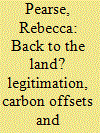|
|
|
Sort Order |
|
|
|
Items / Page
|
|
|
|
|
|
|
| Srl | Item |
| 1 |
ID:
118018


|
|
|
|
|
| Publication |
2013.
|
| Summary/Abstract |
Carbon offsets produced from terrestrial (land-based) emissions reduction projects are a contested frontier of carbon market expansion. Experiments in legislating for and producing terrestrial offsets that come under the title REDD+ have met heated opposition. However, a political consensus about the desirability and feasibility of carbon offsets from avoided deforestation and various land-management practices has slowly emerged. How do terrestrial carbon offsets gain legitimacy in the face of contestation and compelling evidence that creating carbon commodities from land ecosystems is an elusive commodity fiction? It seems that a quiet compromise is emerging over the (re-)commodification of land through carbon trading vis-à-vis the broader process of legitimating marketized climate policy. This paper offers a political-economic analysis of state-led efforts to legitimate a market for land carbon sinks in Australia and the Asia-Pacific region. The dynamics of legitimation and contestation play out as an iterative 'double movement'.
|
|
|
|
|
|
|
|
|
|
|
|
|
|
|
|
| 2 |
ID:
167532


|
|
|
|
|
| Summary/Abstract |
The Indian Ocean is home to some of the most extensive coastal blue carbon ecosystems on the planet. Together, the nations within and surrounding this ocean basin contain approximately 50% (an estimated 76,275 km2) of the world’s mangrove forests and a large, but unknown, proportion of its seagrass meadows. The nations of the Indian Ocean have an opportunity to be world leaders in restoration and protection of these ecosystems, which can help mitigate climate change, enhance livelihoods and protect shorelines from erosion and storm damage. Already, Indian Ocean nations are showing leadership by acknowledging blue carbon ecosystems in their Nationally Determined Contributions, and by championing efforts to establish some of the largest blue carbon restoration projects globally. However, more can be done. We outline a research agenda that will pave the way for effective evidence-based policy in the Indian Ocean, by reducing uncertainty and providing the tools and knowledge needed.
|
|
|
|
|
|
|
|
|
|
|
|
|
|
|
|
| 3 |
ID:
093527


|
|
|
|
|
| Publication |
2010.
|
| Summary/Abstract |
The existing literature generally ascribes the virtual absence of the transport sector from the Clean Development Mechanism (CDM) to the inherent complexity of quantifying emission reductions from mobile sources. We use archival analysis and interviews with CDM decision-makers and experts to identify two additional groups of explanations. First, we show the significance of aspects of the CDM's historical evolution, such as the order in which methodologies were considered and the assignment of expert desk reviewers. Second, we highlight inconsistencies in the treatment of uncertainty across sectors. In contrast to transport methodologies, other sectors are characterized by a narrow focus on sources of measurement uncertainty and a neglect of economic effects ("market leakages"). We do not argue that the rejection of transport methodologies was unjustified, but rather than many of the same problems are inherent in other sectors. Thus, the case of transport sheds light on fundamental problems in quantifying emission reductions under the CDM. We argue that a key theoretical attraction of the CDM-equalization of marginal abatement costs across all sectors-has been difficult to achieve in practice.
|
|
|
|
|
|
|
|
|
|
|
|
|
|
|
|
| 4 |
ID:
138254


|
|
|
|
|
| Summary/Abstract |
This paper presents an analysis of changing rationales and tactics among actors engaged in mobilising private finance for Indonesia's emergent Reducing Emissions from Deforestation and Forest Degradation (REDD+) programme. Despite limited flows of private finance so far, private sector actors have been responsible for a great deal of development and innovation in the forest carbon sector in Indonesia, and have thus played – and continue to play – an important part in shaping the country's REDD+ programme. Drawing on extended field research and interviews with key actors engaged with REDD+ in Indonesia, we identify a variety of private investor motivations, strategies and tactics, many of which depart considerably from the common understanding of REDD+ as avoided deforestation funded through carbon offsets. As non-state actors increasingly shape emerging REDD+ projects, they assume important roles as agents of environmental governance – working through a variety of private market and hybrid modes of forest/climate governance. We describe four general modes of engagement, centred around: investment in REDD+ verified emissions reductions; corporate social responsibility; sustainable commodities; and impact investment. The research thus contributes to an improved understanding of the nature of private REDD+ finance in Indonesia, and the implications, potential and limits of private, market-based climate governance.
|
|
|
|
|
|
|
|
|
|
|
|
|
|
|
|
| 5 |
ID:
098646


|
|
|
|
|
| Publication |
2010.
|
| Summary/Abstract |
Green electricity generation can provide an indirect route to cleaner air: by displacing generation from fossil fuels, green electricity can reduce emissions of CO2 and conventional air pollutants. Several types of voluntary markets have emerged in the United States to take advantage of this relationship, including green electricity programs, carbon offsets, and renewable energy certificates. At the same time, regulators are favoring cap-and-trade mechanisms for regulating emissions. This paper describes the appropriate framing of environmental claims for green electricity products. We apply an accounting framework for evaluating claims made for capped pollutants, with entries for emissions, avoided emissions due to green electricity, and unused emission permits. This framework is applied in case studies of two major electric utilities that operate with green electricity programs and capped pollutants. The cases demonstrate that the relative magnitude of "unused permits" and "emissions avoided" is a key relationship for evaluating an emissions reduction claim. Lastly, we consider the evolution of the green electricity marketplace given the reliance on cap-and-trade. In this setting, pollution-emission products could be decoupled from one another and from the various green electricity products. Several positive consequences could transpire, including better transparency of products, lower certification costs, and more product choices.
|
|
|
|
|
|
|
|
|
|
|
|
|
|
|
|
|
|
|
|
|